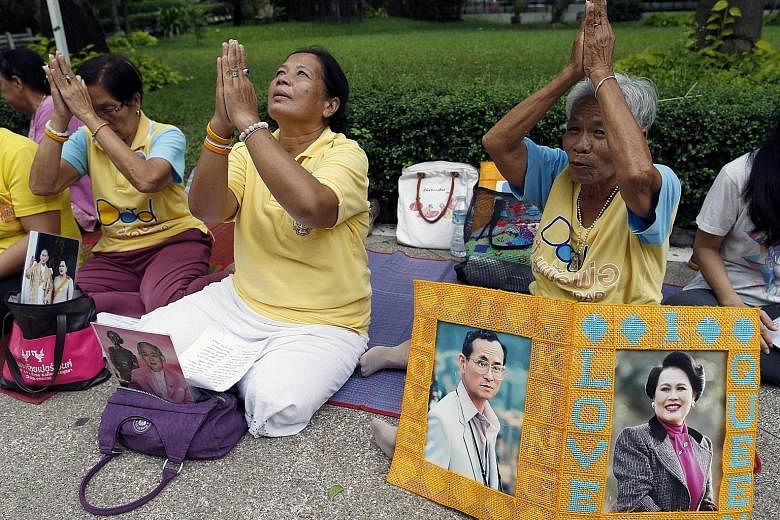BANGKOK • Thai shares fell 3.6 per cent yesterday in their biggest intra-day percentage drop since August last year after the palace said late on Sunday that King Bhumibol Adulyadej was in an unstable condition after receiving haemodialysis treatment.
The Thai baht also fell for the sixth day, the longest stretch of losses this year.
The statement issued by the Royal Household Bureau on Sunday evening said a ventilator was deployed after the monarch's blood pressure dipped following procedures to prepare him for dialysis and to change a tube that helps drain fluid from his spine.
"The medical team is watching his symptoms and giving treatments carefully because the overall symptoms of his sickness are still not stable," the statement said.
It is unusual for the palace to state that the King's health is not stable. Statements on his health are usually issued after his condition shows improvement or when he is recovering from an illness.
The palace had said on Oct 1 that the 88-year-old King's condition had improved following a lung infection.
He has been treated in recent months for hydrocephalus - a condition characterised by increased fluid in the cranium - and undergone a procedure to clear narrowing arteries in his heart.
Anxiety over King Bhumibol's health and the eventual succession has formed the backdrop to more than a decade of bitter political divide in Thailand that has included two military coups and often- violent street demonstrations.
But open discussion of his legacy and the future of the institution is all but impossible because of the lese majeste law. Use of the law has surged under the ultra-royalist generals that seized power in a 2014 coup.
"In the short term, it will create some uncertainty for Thailand, which will mean we'll see not as many people wanting to invest," said Mr Josh Crabb, head of Asian equities at Old Mutual Global Investors in Hong Kong.
The Thai stock index closed at its lowest in over three weeks, dragged down by financial and consumer stocks.
Investors shrugged off deputy prime minister Somkid Jatusripi- tak's comments yesterday that Thailand's economy is expected to grow 3.2 per cent to 3.5 per cent this year.
"The economy is now moving forward from increasing foreign direct investment and a record high number of tourists," he told reporters.
The military government, which seized power in a May 2014 coup after months of street protests against the elected administration, has said it aims to revive the underperforming economy by spending on big-ticket infrastructure projects.
Thailand expects to invest US$4.3 billion (S$5.9 billion) on infrastructure over the next five years, Mr Somkid said.
"Our economic fundamentals remain strong and it (stock market) will be back up shortly," he said.
REUTERS, BLOOMBERG, AGENCE FRANCE-PRESSE

